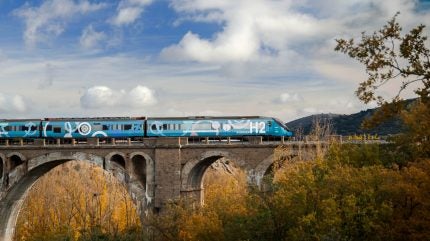
The FCH2Rail project developing a bimodal hydrogen fuel cell-powered train in Europe has completed testing in Portugal, becoming the first to operate a hydrogen train in the country.
Following on from extensive tests of the technology in Spain last year, the Portugal testing campaign took place in early April on the Minho line between Valença and Nine in collaboration with Infraestruturas de Portugal, the country’s rail and road infrastructure manager.
Funded by the European Clean Hydrogen Partnership, the €14m FCH2Rail project consists of a consortium of businesses including Spanish rolling stock manufacturer CAF as well as Adif, Renfe, German Aerospace Centre, Toyota Motor Europe, Spanish National Hydrogen Centre, and Stemmann Technik.
For the Portugal section of testing, the project was also supported by companies including Stellantis, which provided use of its facilities in Pontevedra for refuelling, Medway, which provided train drivers to operate the vehicle, and Iberdrola, which supplied the green hydrogen used during testing.
The four-year project was launched in 2021 after the European Commission’s Fuel Cells and Hydrogen Joint Undertaking selected the consortium to develop a hydrogen-powered train prototype.
The rolling stock has been designed to address the emissions issue posed by the partial electrification of Europe’s rail network and replace the carbon-emitting diesel trains currently used to bridge the gap between electrified and non-electrified sections.
Following testing in Portugal, the prototype train has now driven more than 8,500km in hydrogen mode.
The project is one of a number developing a hydrogen-powered train and sits alongside other models such as Stadler’s FLIRT H2, which has completed the longest continuous journey by a hydrogen train at 2,800km, and Talgo’s Hympulso high-speed hydrogen train currently in development.



